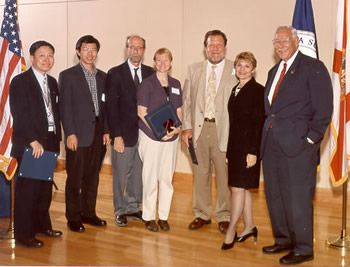Exploring Bioinformatics at Nova Southeastern University
Grant Winners
- Matthew He, Ph.D. – Farquhar College of Arts and Sciences
- Emily Schmitt, Ph.D. – Farquhar College of Arts and Sciences
- Junping Sun, Ph.D. – Graduate School of Computer and Information Sciences
- Edward Keith, Ph.D. – Oceanographic Center
Deans
- Norma Goonen – Farquhar College of Arts and Sciences
- Edward Lieblein – Graduate School of Computer and Information Sciences
- Richard Dodge – Oceanographic Center
Abstract

Bioinformatics is an emerging scientific discipline that combines biochemistry and biotechnology with computer and information sciences in an attempt to extract higher-level understanding of genomic data. Bioinformatics applies mathematics (e.g. probability and statistics) and systems theory (e.g. computer programming) to the analysis of biochemical and genetic data. We propose the establishment of a series of bioinformatics projects at Nova Southeastern University conducted by faculty from the Division of Math, Science, and Technology (Farquhar College of Arts and Sciences),the Graduate School of Computer and Information Sciences, the Oceanographic Center, and industrial representatives. We will also collaborate with and contribute to the Genome Consortium for Active Teaching (GCAT) based at Davidson College, NC, which has already received funding from the National Science Foundation to support collaborations with undergraduate programs nationwide. Our proposed projects include monthly bioinformatics seminars, an annual bioinformatics conference, the establishment of a course in bioinformatics, the submission of grants for curriculum development, and the formulation of a degree program in bioinformatics. The Human Genome Project, as well as other projects focused on a variety of organisms, has initiated a revolution in the volume and quality of genomic data that are generated. There is a need to analyze this voluminous quantity of data in order to realize the promise of new methods of disease diagnosis and treatment. We believe that our proposed bioinformatics projects can prepare faculty and students from NSU to participate in this new frontier, and contribute to its advancement. We anticipate that graduates from such a bioinformatics curriculum could find employment and/or continue their education in graduate and medical programs.